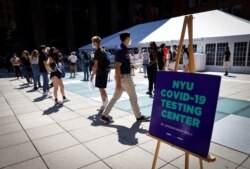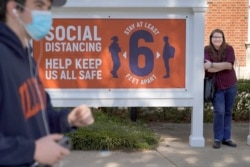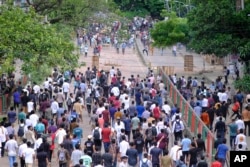Student Union
More Universities to Close After Thanksgiving
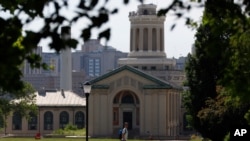
As COVID-19 cases surge around the U.S., more universities and colleges plan to move all classes online after Thanksgiving break in late November, while others say they will allow students to return to campus.
The University of Pennsylvania, University of Arizona, University of California in Los Angeles and Berkeley, Syracuse University in New York, and the University of Michigan are among the increasing number of schools ending all in-person classes for the semester after Thanksgiving.
The University of Arizona will, too, switch to remote learning over the break, and like the University of California and many other schools, will make the dorms available for the remainder of the semester for those who don’t have alternate housing.
“It is such a major operation, safely, to get all the students back to campus, that you really cannot manage that more than twice a year,” explained Frederick M. Lawrence, former president of Brandeis University in Massachusetts and chief executive officer of the Phi Beta Kappa Society in Washington.
“You bring them on board, [and] you keep them as safe as you can during the time they're there,” said Lawrence. “You send them all home [for holidays] … but then they stay home.”
In a non-pandemic year, students usually join their families for Thanksgiving, a harvest celebration involving a lot of food and televised college football games. Students typically return to campus for about a month until late December, when the semester ends for winter break. After three to four weeks of winter break, that include the Christmas and New Year’s holidays, students return to campus for the start of new classes in January.
But the pandemic has upended a campus calendar that has carried on for decades. Millions of students are normally on the move over Thanksgiving and the winter holidays, the most traveled U.S. holidays of the year, reported the U.S. Bureau of Transportation Statistics.
Because cases of COVID-19 are reaching record highs, schools are trying to mitigate the impact students might have on spreading the virus.
Most State University of New York (SUNY) schools will require students to submit a negative COVID-19 test before heading home for Thanksgiving. SUNY, with 415,572 students, is spread among 64 campuses around the state that hosts the second-largest population of international students, nearly 125,000. (New York University in New York City is the No. 1 destination for foreign students.)
"By requiring all students to test negative before leaving, we are implementing a smart, sensible policy that protects students' families and hometown communities and drastically reduces the chances of COVID-19 community spread," said SUNY Chancellor Jim Malatras in a press release.
Indiana University (IU) will require its 48,514 students to have exit testing as they head home for the Thanksgiving break. Last week (November 11), some IU students were suspended for celebrating in the streets after a football win. The week before, the university shut down its Delta Upsilon fraternity house through summer 2021, for hosting a large, unmasked Halloween party.
“Students will leave a state with skyrocketing new COVID-19 cases and some might sit next to grandparents a few days later,” tweeted Matt Cohen, enterprise reporter for the Indiana Daily Student news outlet.
The University of Missouri, another large Midwestern state university, changed its plan last week to online learning for its 29,843 students. The decision, announced November 12, came after a surge in COVID-19 cases in Missouri, according to University of Missouri System President Mun Y. Choi.
Until the surge, Missouri considered limited internet access at home, finances, and their COVID-19 case count when deciding to keep the campus open after the break, said University of Missouri Spokesperson Christian Basi.
“We have many students who rely on on-campus work to provide them with a source of income and if we were to close the campus not only would many of the students not be able to return, but there are some of those jobs that simply would stop,” said Basi.
“We have been managing the pandemic here on campus extremely well. Our active caseload has fallen about 90% since it peaked over the Labor Day weekend” in September, said Basi.
The University of Maryland (UMD), which had planned to bring students back after the break, also retracted their decision last week and will be completely online after Thanksgiving for its 40,521 students, according to an email sent by UMD President Darryll Pines to students.
UMD and the University of Wisconsin are among other schools that have told students who travel for the break that they will not be allowed to return to campus. The university will switch to all online instruction, but campus will remain open for students who don’t have housing options.
The University of Georgia (38,920 students) and Youngstown State University (11,788) in Ohio will allow students to return to campus in person after the November 26 Thanksgiving holiday, they announced.
The University of Alabama (37,842 students), too, will resume classes after the break, and will offer exit testing for the Thanksgiving and winter breaks for students who request it.
Lawrence said testing and quarantine are key to controlling the spread of COVID-19 among college campuses.
“If students are going to be coming back, there has to be a combination of testing if they're going to be on campus, and quarantining, even if they're just going to be off-campus in off-campus apartments,” said Lawrence.
Lawrence said because of how quickly the virus spreads, universities returning after the break should implement a series of protocols for students.
“It's too much back and forth. That's too much interaction with people outside the bubble and coming back to campus,” said Lawrence.
“The model has to be a big break and then come January, February, a replay of the entire operation schools did in August and September, to bring students back to campus safely,” said Lawrence.
The American College Health Association issued an advisory in October to help colleges and universities navigate the end of the semester. The U.S. does not have a national plan for higher education and COVID-19.
Four sources are compiling information about colleges and COVID-19, including case-tracking maps: The New York Times, The Chronicle of Higher Education, Davidson College’s College Crisis Initiative (C2i), and Inside Higher Education.
Most international students face holidays alone or without family. Some schools are encouraging all their students not to go home for the break, and are offering alternative activities and turkey meals, the typical centerpiece on most American dinner tables for Thanksgiving.
Iuliia Rychkova is an international doctoral student at the University of Mississippi, which will end its fall semester before the Thanksgiving break.
“I'm going to stay in Oxford,” where the university has its main campus, she said.
“Honestly, I'm an international student, right? So it's kind of pricey to go home for a month,” said Rychkova, who is from Novokuznetsk, Russia, which lies east of Kazakhstan and west of Mongolia.
See all News Updates of the Day
Tips for first-year international students in the US
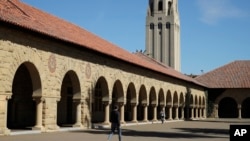
Book your flights right away, get a U.S. phone plan, make sure you have linens for your dorm and attend orientation – that’s some of the advice international students have for first-year college students coming from abroad.
U.S. News & World Report compiled helpful tips for students studying in the United States for the first time. (July 2024)
Survey: Social integration, career prep are important to international students
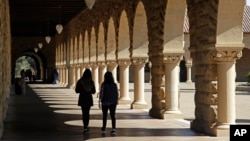
A recent survey of international students in the United States found that before starting school, they were concerned about personal safety, making friends and feeling homesick.
Inside Higher Ed reports that international students want specialized orientations, peer connections, career preparation and job placement to help make their college experiences successful. (July 2024)
US advisory council ends Nigeria visit, signs student exchange deal
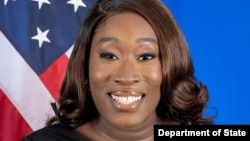
Members of a U.S. presidential advisory council have approved a student exchange deal between an American college and a Nigerian university as part of the council's effort to strengthen collaboration on education, health, entrepreneurship and development between Africa and Africans living abroad.
The council also visited a health facility supported by the United States Agency for International Development in the capital.
Nigerian authorities and visitors chatted with members of the U.S President's Advisory Council on African Diaspora Engagement as they toured a healthcare facility in Karu, a suburb of Abuja, on the last day of the council's three-day visit to Abuja and Lagos.
The facility is one of many supported by the United States Agency for International Development, or USAID, to improve the management of childhood illnesses, family planning, immunization and delivery.
The tour was part of the council's effort to promote African diaspora-led investments in technology entrepreneurship, education and healthcare delivery.
"They're doing a phenomenal job there, it really gave us a sense of what the healthcare system is in Nigeria," said Deniece Laurent-Mantey, executive director of the advisory council. "This is our first trip as a council to the continent and we chose Nigeria for a reason — the diaspora in Nigeria is very active, very influential, and they're really a source of strength when it comes to our U.S.-Africa policy. And so for us coming to Nigeria was very intentional."
The council was created by President Joe Biden in September to improve collaboration between Africa and its diaspora in terms of economic and social development.
Akila Udoji, manager of the Primary Healthcare Centre of Karu, said officials in Nigeria were pleased that the council members were able to visit.
"We're happy that they have seen what the money they have given to us to work with has been used to do, because they have been able to assist us in capacity-building, trainings, equipment supply and the makeover of the facility," Udoji said.
Earlier, the council signed a deal for a student exchange program between Spelman College in the southern U.S. city of Atlanta and Nigeria's University of Lagos.
Laurent-Mantey said education exchanges are one of the council's top priorities.
"In Lagos, we had the president of Spelman College — she's also a member of our council — she signed an agreement with the University of Lagos to further education exchange programs in STEM and creative industries between those two universities," Laurent-Mantey said. "And I think for us it's very important, because Spelman College is a historically Black university, and so here we are promoting the importance of collaboration between African Americans and Africans."
In March, the advisory council adopted its first set of recommendations for the U.S. president, including the student exchange initiative, advocating for more U.S. government support for Africa, climate-focused initiatives, and improving U.S. visa access for Africans.
The council met with Nigerian health and foreign affairs officials during the visit before leaving the country on Wednesday.
American Academy of the Arts College announces closure
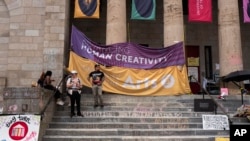
The American Academy of Art College in Chicago announced it would be closing after 101 years of preparing students for careers in art and illustration.
WTTW news reported that like other art colleges, the academy saw enrollment drop after the pandemic, and officials made the decision to close the college last month. (July 2024)
5 killed, dozens injured in clashes over Bangladesh jobs quota system
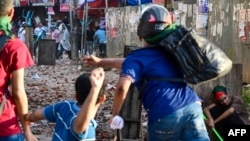
At least 5 people were killed and dozens injured in two separate incidents in Bangladesh as violence continued Tuesday on university campuses in the nation's capital and elsewhere over a government jobs quota system, local media reports said quoting officials.
At least three of the dead were students and one was a pedestrian, the media reports said. Another man who died in Dhaka remained unidentified.
The deaths were reported Tuesday after overnight violence at a public university near Bangladesh's capital, Dhaka. The violence involved members of a pro-government student body and other students, when police fired tear gas and charged the protesters with batons during the clashes, which spread at Jahangir Nagar University in Savar, outside Dhaka, according to students and authorities.
Protesters have been demanding an end to a quota reserved for family members of veterans who fought in Bangladesh's war of independence in 1971, which allows them to take up 30% of governmental jobs.
They argue that quota appointments are discriminatory and should be merit-based. Some said the current system benefits groups supporting Prime Minister Sheikh Hasina. Some Cabinet ministers criticized the protesters, saying they played on students' emotions.
The Bengali-language Prothom Alo daily newspaper reported that one person died in Dhaka and three others, including a pedestrian, were killed after they suffered injuries during violence in Chattogram, a southeastern district, on Tuesday.
Prothom Alo and other media reports also said that a 22-year-old protester died in the northern district of Rangpur.
Details of the casualties could not be confirmed immediately.
While job opportunities have expanded in Bangladesh's private sector, many find government jobs stable and lucrative. Each year, some 3,000 such jobs open up to nearly 400,000 graduates.
Hasina said Tuesday that war veterans — commonly known as "freedom fighters" — should receive the highest respect for their sacrifice in 1971 regardless of their current political ideologies.
"Abandoning the dream of their own life, leaving behind their families, parents and everything, they joined the war with whatever they had," she said during an event at her office in Dhaka.
Protesters gathered in front of the university's official residence of the vice chancellor early Tuesday when violence broke out. Demonstrators accused the Bangladesh Chhatra League, a student wing of Hasina's ruling Awami League party, of attacking their "peaceful protests." According to local media reports, police and the ruling party-backed student wing attacked the protesters.
But Abdullahil Kafi, a senior police official, told the country's leading English-language newspaper Daily Star that they fired tear gas and "blank rounds" as protesters attacked the police. He said up to 15 police officers were injured.
More than 50 people were treated at Enam Medical College Hospital near Jahangir Nagar University as the violence continued for hours, said Ali Bin Solaiman, a medical officer of the hospital. He said at least 30 of them suffered pellet wounds.
On Monday, violence also spread at Dhaka University, the country's leading public university, as clashes gripped the campus in the capital. More than 100 students were injured in the clashes, police said.
On Tuesday, protesters blocked railways and some highways across the country, and in Dhaka, they halted traffic in many areas as they vowed to continue demonstrating until the demands were met.
Local media said police forces were spread across the capital to safeguard the peace.
Swapon, a protester and student at Dhaka University who gave only his first name, said they want the "rational reformation of the quota scheme." He said that after studying for six years, if he can't find a job, "it will cause me and my family to suffer."
Protesters say they are apolitical, but leaders of the ruling parties accused the opposition of using the demonstrations for political gains.
A ruling party-backed student activist, who refused to give his name, told The Associated Press that the protesters with the help of "goons" of the opposition's Bangladesh Nationalist Party and Jamaat-e-Islami party vandalized their rooms at the student dormitories near the Curzon Hall of Dhaka University.
The family-of-the-veterans quota system was halted following a court order after mass student protests in 2018. But last month, Bangladesh's High Court nulled the decision to reinstate the system once more, angering scores of students and triggering protests.
Last week, the Supreme Court suspended the High Court's order for four weeks and the chief justice asked protesting students to return to their classes, saying the court would issue a decision in four weeks.
However, the protests have continued daily, halting traffic in Dhaka.
The quota system also reserves government jobs for women, disabled people and ethnic minority groups, but students have protested against only the veterans system.
Hasina maintained power in an election in January that was again boycotted by the country's main opposition party and its allies due to Hasina's refusal to step down and hand over power to a caretaker government to oversee the election.
Her party favors keeping the quota for the families of the 1971 war heroes after her Awami League party, under the leadership of her father, Sheikh Mujibur Rahman, led the independence war with the help of India. Rahman was assassinated along with most of his family members in a military coup in 1975.





